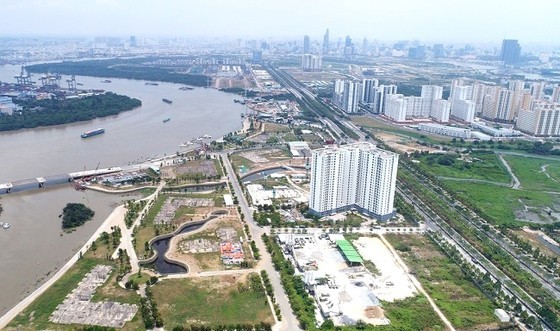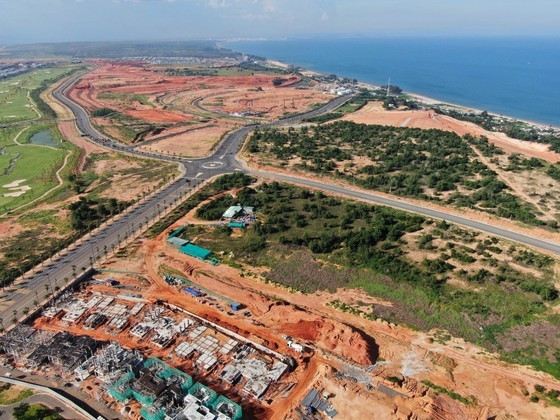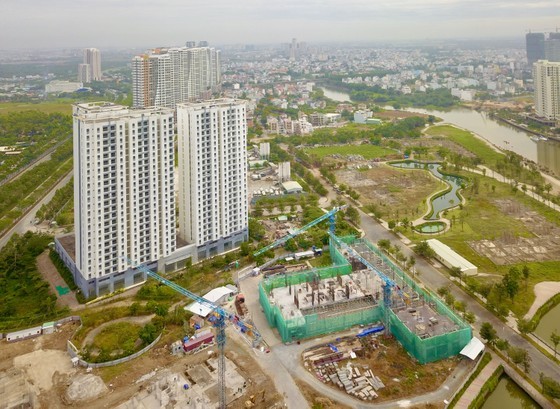 |
A real estate project of Novaland in District 2, HCMC. (Photo: SGGP) |
Daily interest payments of more than VND27 billion
Recently, at the national online conference to remove difficulties and promote a healthy and sustainable real estate market, reporting to the Prime Minister, Mr. Bui Thanh Nhon, Chairman of the Board of Directors of Novaland Investment Group Corporation (NVL), said that interest rates climbed quite rapidly since the end of last year, with some loans seeing interest rate increasing by nearly 30 percent. Difficulties have besieged the company when legal approval for real estate projects has stalled, as most projects are formed from borrowed capital. On-hold projects still require the company to pay interest and maintain operations, as well as other expenses.
According to statistics from the consolidated financial statements of the fourth quarter of 2022 of ten large-scale real estate enterprises listed on the stock exchange, the interest paid in the previous year was nearly VND22.64 trillion, accompanied by a debt of up to VND793.12 trillion, and inventory of VND314.98 trillion.
This report shows some large companies that made high interest payments in the past year. First, Vingroup (VIC), with the largest market scale, paid over VND9.96 trillion in interest, or over VND27.2 billion in interest per day. Nova Group (NVL) expended over VND6.1 trillion in interest in 2022 or nearly VND17 billion per day. Next is Ho Chi Minh City Infrastructure Investment Joint Stock Company (CII), with interest paid last year of VND1.56 trillion, including liabilities of VND20.26 trillion.
For Gelex (GEX), although it had a profit of VND247 billion last year, it paid over VND1.45 trillion in interest, meaning paying interest nearly six times its profit, or about VND4 billion in interest per day. The GEX's financial report shows that its liabilities are nearly VND31.34 trillion, and inventory is over VND9.13 trillion.
Preliminary analysis of the consolidated financial report for the fourth quarter of 2022 of listed companies on the stock exchange shows that the larger the scale of real estate companies, the higher the debt to be paid, which means that the burden of interest is also higher.
 |
Novaworld Phan Thiet-Binh Thuan project (Photo: SGGP) |
For example, NVL simultaneously deployed three major projects, including Novaworld Ho Tram in Ba Ria - Vung Tau Province with an area of 1,000 hectares, Aqua City project in Dong Nai Province with an area of 1,000 hectares, and Novaworld Phan Thiet in Binh Thuan Province with an area of 1,000 hectares.
Along with many other projects, NVL has pushed its debts to roughly VND212.43 trillion and its inventory to VND134.48 trillion, both of which have increased significantly compared to the previous year, as well as the interest paid on the loans.
From another perspective, loans by real estate businesses come with relatively high interest rates. This is illustrated by the case of CII's bond loans in 2020. At that time, the economy was progressing favorably, and CII issued a batch of bonds worth VND2 trillion on March 13, 2020, with an interest rate of up to 11 percent per annum.
Similarly, the Kinh Bac Urban Development Corporation (KBC) had a loan of VND319 billion from the Vietnam Bank for Industry and Trade (VietinBank) at an interest rate of 14 percent per annum, with the first disbursement made on December 15, 2022. This company had to pay VND1.3 billion in interest per day last year, with a debt of VND17.07 trillion and an inventory of VND12.25 trillion.
Is prolonged legal procedures the cause?
Regarding the current interest rate situation for real estate loans, many companies have said that it is already difficult to obtain loans. Even if they can receive loans, with such high interest rates as currently, they will only temporarily alleviate the stress but will become a burden, eroding the health of the company in the long run.
According to Mr. Nguyen Van Hau, CEO of Asian Holding Real Estate Joint Stock Company, the actual interest rate for loans is from 13 percent to 15 percent per annum, but customers cannot borrow directly. They have to rely on a brokerage firm to support the loan, which will cost an additional 2 to 3 percent per year, and if they pay before the due date, they will be penalized by the bank with 3 percent per year. So, the total borrowing costs have risen to nearly 20 percent per annum.
Another major issue that real estate businesses have long faced is legal procedures. Mr. Ha Van Thien, Deputy General Director of Tran Anh Group, analyzed that in the past, with access to bank interest rates, the first-year interest rate was around 11 percent, and the floating interest rate was 12-14 percent per annum after a year, not including some other costs.
 |
A half-done project of Novaland in Thu Duc City (Photo: SGGP) |
The life cycle of a real estate project, if smooth, is from 3-5 years, with interest rates below 5 percent of the total project revenue. However, if a project is delayed and prolonged for ten years or more, the interest rate will account for a large proportion of the total revenue, and the project may face losses.
Meanwhile, Mr. Vo Hong Thang, Deputy Director of Research and Development of DKRA Vietnam Group, predicts that market liquidity in the first half of 2023 is likely to maintain at a low level. If lending interest rates continue to stay as high as the current level or escalate further, the market will fall into a vicious cycle, in which, sellers will accept lower prices to sell their products, while buyers will be more cautious in their decision to invest in real estate, waiting for further price reductions.
To overcome these challenges, it is necessary to have cooperation from various entities participating in the market. From a macro-management perspective, recent consecutive meetings between the government and departments are expected to open up new directions and soon resolve market difficulties. Regarding their internal operations, real estate companies need to optimize their operating costs, streamline their personnel, and reduce input costs. Subsequently, priority should be given to developing strategic projects that have completed legal procedures, avoiding spreading out investment and implementing many projects at once as before.
Mr. Le Huu Nghia, Vice Chairman of the HCMC Real Estate Association: If the law is hindering, why don’t we remove it?
"According to common practice, loans account for about 70 percent of the capital structure of a real estate project, meaning that the project is largely formed from borrowed capital. For many years, there has been a situation in which projects are not approved due to legal obstacles, but the investors still struggle to pay interest.
The question is that if the law is hindering, why don’t we remove it, since we are the ones who make the law? Banks will grant a loan if a project has a sufficient legal approval. However, if the legal procedures are not approved, how can a loan be granted? If this situation lasts for another two years, the interest will eat up the entire project.
In my opinion, if legal obstacles are removed in time, the market will have a supply source, thereby resolving difficulties for the real estate market and loosening the knot for the economy."
Mr. Dang Van Thanh, Director of Viet Phu An Construction - Real Estate Company: Interest expense can be nearly VND150 trillion
A recent report by the Ministry of Construction shows that by December 31, 2022, real estate enterprises had borrowed nearly VND800 trillion, and capital mobilization through bond channels by December 25, 2022, was VND419 trillion. If the average loan interest is about 11 percent per annum via the banking channel and 13 percent per annum via bonds, the interest payable may be nearly VND150 trillion.
























